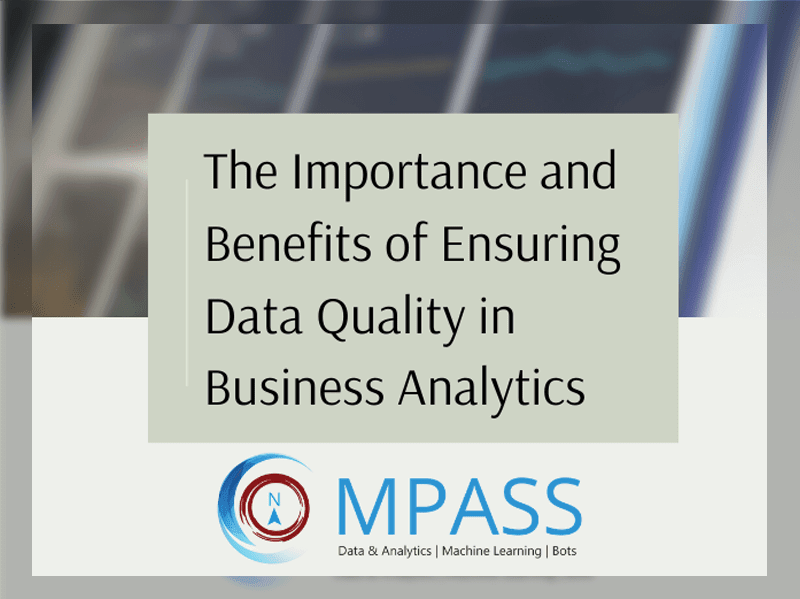In 2017, The Economist reported that data is the oil of the digital era and has dethroned oil as the most valuable resource in the world. But unlike oil, extracting, maneuvering, filtering, refining and storing the continuous stream of data from various internal and external sources is a herculean task. But organisations which have focused and achieved high data quality to a degree have benefited in the highly competitive markets. In order to capture and ensure high data quality in today’s ocean of information, enterprises need the support of the right tools, resources, technologies and experts.
Data is only as good as its quality. Even a slight deviation in quality could lead to faulty business decisions which in turn could cost hundreds of thousands of dollars for a business. And in the current rapid pace of business, decisions need to be taken ever faster which increases the risk even higher. Wrong data leads to wrong analytics leading to wrong decisions.
Therefore, achieving a high level of data quality, which is free of inaccuracies, inconsistencies, biases and manipulations, should be the key objective for today’s data-driven business world.
Let’s Take A Look At The Benefits Of Ensuring High Data Quality
Promotes Informed Decision-Making
We have observed that every business decision, be it at the individual level or corporate level, has an indirect or direct impact on the bottom-line. And if these decisions are driven by poor data practices, then it causes more harm than good. Case in point: 84% of CEOs have conveyed concern over the lack of trust in the quality of the data while making decisions.
By meeting the quality standards of good data, organizations develop better control over the outcomes of these decisions. This in turn improves confidence in data, efficiency, eradicates errors and lowers risk.
The inherent qualities of ‘good data’ include accuracy, consistency, completeness, being up-to-date and it comes from reliable & secured sources. When data has all these qualities, the insights you obtain from your analytics and business intelligence system will be relevant, accurate, and authentic.
Improves Customer Experience
Ensuring high data quality leads to better customer engagement and experience, which is a business imperative. Take, Netflix, for example. The company has scaled new heights when it comes to customer experience. That’s why it is synonymous with binge-watching. In their tech blog, Netflix wrote at length about their data strategy and how it has helped them to improve the personalization and recommendation engine of their business.
“One thing we have found at Netflix is that with the great availability of data, both in quantity and types, a thoughtful approach is required to model selection, training, and testing. We use all sorts of machine learning approaches: From unsupervised methods such as clustering algorithms to a number of supervised classifiers that have shown optimal results in various contexts,” the company shared.
Netflix also mentions that the combined effect of personalization and recommendations save them more than $1B per year. This is possible due to the high quality data and personalization and recommendation algorithms the company uses. These algorithms help the company improve their take-rate (number of recommendations given resulting in a play) and overall engagement (streaming hours) and reduce their subscription cancellation rates. Due to the low cancellation rates, the company doesn’t have to spend more money to acquire consumers for replacing the cancelled members . This in turn reduces the company’s acquisition costs.
The inclusion of recommendations in their strategy with the help of AI algorithms accelerated the growth of the company. And these algorithms were powered by good data that were precise, consistent, relevant and valid. Another positive outcome of taking decisions based on high quality data is that companies could save billions of dollars by avoiding wrong recommendations, manual work, data decay and damaged reputation and fines.
Limits Risks
According to IDC’s projections, 79.4 zettabytes of data will be generated just by connected IoT devices by 2025. And Inc reported that 73% of company data remained unused and untouched for analytics. With so many interconnected devices, the volume of data being created is not going to drop anytime soon. A considerable percentage of this data is unstructured.
The huge gap between analyzed data and unused data poses a threat to companies who own this data. After all, it is a valuable fuel – an asset. It not only increases the risk of misuse, but also of losing customers’ trust and confidence.
By devising a seamless data quality and master data management plan that efficiently filters good and bad/irrelevant bits of information, companies can limit their liability. They can choose what data to capture, what to save and what to ethically (and with accountability) discard. It would not only save time and money, but also limit risk and help to avoid litigation in the future.
Enables And Maintains Compliance
A facet that we diligently focus on while working with our clients is communicating the importance of harbouring a culture of data. It can’t function optimally in isolation – which ties back to the decision-making feature we mentioned above. Since data veracity largely depends on the company’s overall culture and the adaptation level across the board, it automatically enables companies to follow compliance regulations and maintain the highest standards of accuracy and governance.
For instance, only the companies with quality data would be able to comply and quickly adapt to new regulations set by authoritative bodies like European Union’s General Data Protection Regulation (GDPR).
Tips To Ensure Data Quality
We discussed the benefits of good data and the characteristics that define quality data. Let’s explore how to ensure that your business’ data meets the quality standards.
- Assess the quality of your data at regular intervals and document the issues, errors and gaps.
- Quantify the impact – positive and negative, both – of data quality. Identify and amplify the business value generated from good data and the cost of poor data quality.
- Identify the key elements that represents your business, which are required to grow the company at a faster yet sustainable rate. Then, focus on those data sources to refine good from irrelevant/poor data.
- Work towards creating a central database of data where only relevant, complete unique and reliable information stays.
- Zero down on the right mix of tools, methods and technologies for error-free data analysis.
- Collaborate with data scientists, analysts and experts besides setting up a core data team. Ensure that there is no ambiguity in accountability and that the data governance rules are clearly communicated to all.
Wrapping Up
We are currently living in an era in which data explosion shows no sign of slowing down. Thereby, in such a scenario, ensuring that the quality of data meets the highest standards is no longer an IT or BI (Business Intelligence) issue but a business imperative. Business analytics helps to make better decisions, formulate effective strategies and improve customer engagement metrics. But as we have illustrated, the results of the analysis is directly dependent on the data quality and accuracy. They are the cornerstones of successful, dynamic and accurate business analytics.
By introducing measures for data governance and filling the gaps, companies can make informed decisions in business, turn data into a viable asset while reducing liability, enhancing customer engagement and improving compliance in business.
If you’re looking to improve your enterprise data quality or have any questions regarding this topic, please feel free to get in touch with one of analytics and database experts for a personalized consultation.
You may also be interested in checking out Acuvate’s Data Cleansing and Master Data Governance Solutions for further insights.



